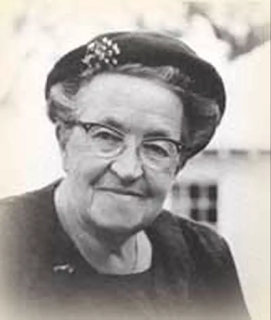 |
| Corrie ten Boom |
Corrie ten Boom is credited with saying “You can never learn that Christ is all you need, until Christ is all you have.” Dozens of devotional essays on the Web feature this quotation, mostly with the (probably laudable) purpose of encouraging personal piety.
Nobody doubts Corrie ten Boom's authority to make this claim, based as it is on her own experience of being in a Nazi concentration camp, left with literally nothing of her own, under the constant threat of death. Her father Casper had already died shortly after their arrest, and sister Betsie died in the concentration camp. Their crime? They had sheltered "the people of God" (as Casper called them): Jewish people.
The quotation itself has always puzzled me. Are we literally unable to learn total dependence on Christ without having everything precious to us, even our freedom, taken away? Is this another impossible standard of holiness, another form of spiritual athleticism that can be used by preachers to tell us how inadequate we are?
But recently I've been thinking about her words in some new ways. First of all, it brought to mind Isaiah's teaching: "Thou wilt keep [them] in perfect peace whose mind is stayed on thee.... (from Isaiah 26:3). This too can be interpreted as an outrageous claim: just keep thinking about Jesus and nothing bad will happen -- not a promise the ten Boom family experienced in this life. Now I see the promise in a different way: the choice to keep one's mind stayed on Christ is a choice that nobody can take away. Whether we will in fact remember that choice under trial is nothing to be glib about, nothing to make the subject of sentimental teachings from affluent preachers to affluent audiences, but it is still a desperately worthwhile goal.
Secondly, and closely related: Corrie's words are a powerful corrective to much that is repellent about contemporary Christianity. Recently I've seen Christians mocking other Christians for stating their pronouns, for advocating being "safe men" (apparently what we need are dangerous men!), for using contemporary music in worship. (You know, even assembling this list might be a form of mocking; I better quit before I enjoy it too much....) So much of what passes for discourse among Christians (Quakers included) seems so hypercritical and crabby. And I won't even go into all the ways Christians scandalize the secular world we're supposed to be engaging.
For all this negativity, I hear Corrie's words as a severe but refreshing corrective. If the last choice I had in this world would be to stay centered on Christ, can I exercise, or at least imagine, that choice right now? What would that do to my priorities? How would that affect how I communicate what's in my heart and listen to what's in yours?
This same exercise is helping me to confront despair. God is apparently not forcing humanity to make decisive choices concerning global warming (although nobody could accuse God of hiding the evidence). God is not staying the trigger fingers on the front lines in Ukraine. Basically, God doesn't seem to be doing what I spend hours asking God to do. Intellectually I know that we humans have the ability and freedom to treat each other cruelly, to overthrow each other's empires and sabotage democracies, and even to choose self-extinction. We're not guaranteed happy endings to any story at all, except one: our relationship with our Creator. Prayer is an expression of that relationship, but not a form of control. The relationship itself is where we rest.
Corrie's words have implications for evangelism, since (speaking somewhat facetiously here) the higher the proportion of people on our planet who prioritize their relationship with the Creator over the temptations to correct and control others, the better our lives will be. However, that's not likely to happen as long as those who already identify as Christians are not choosing to keep our minds stayed on Christ, who are not realizing that Christ is all we really have.
Here is the power of Corrie ten Boom's words: They correct and refresh without mocking, without controlling. Hers is simply the honest voice of testimony. Can we do likewise?
Earlier vaguely-related posts:
Ecological Grief, an experiential workshop under the care of Quaker Earthcare Witness, is scheduled for September 21, 7:00-8:30 p.m. Eastern (USA) time.
Russia: students recorded a patriotism lesson.
Ivan Safronov is sentenced to prison for 22 years. Why?
"Don't mention the war." Russians and the limits of "agreeableness."
Which is the first commandment of all? (Part of Becky Ankeny's series "Jesus and His Bible.")
The people of Sierra-Cascades Yearly Meeting of Friends: Kendra Purcell remembers her friend Bernie Bosnjak.
Prayer can be difficult. The trees help.
Lightnin' Hopkins.
No comments:
Post a Comment